戰爭注定:中美能否擺脫修昔底德陷阱?
2017 年 5 月 30 日
作者:格雷厄姆·艾利森 2015 年 9 月 24 日
哈佛大學約翰·F·肯尼迪政府學院道格拉斯·狄龍政府學教授。
中國和美國正在走向一場雙方都不希望發生的戰爭。原因是修昔底德陷阱,這是一種致命的結構性壓力模式,當崛起的國家挑戰統治國家時就會產生這種結構性壓力。 這種現象與曆史本身一樣古老。 關於摧毀古希臘的伯羅奔尼撒戰爭,曆史學家修昔底德解釋說:“正是雅典的崛起以及由此給斯巴達灌輸的恐懼,使得戰爭不可避免。” 過去 500 年來,這種情況已經發生了十六次。 其中十二個地區爆發了戰爭。 如今,隨著勢不可擋的中國逼近不可撼動的美國,習近平和特朗普都承諾讓自己的國家“再次偉大”,第十七起案件顯得嚴峻。 除非中國願意縮減其野心,或者華盛頓能夠接受成為太平洋地區的第二大國家,否則貿易衝突、網絡攻擊或海上事故可能很快就會升級為全麵戰爭。
哈佛大學著名學者格雷厄姆·艾利森在《注定一戰》一書中解釋了為什麽修昔底德陷阱是理解二十一世紀中美關係的最佳鏡頭。 通過不可思議的曆史相似之處和戰爭場景,他展示了我們距離不可想象的事物有多近。 然而,艾利森強調戰爭並非不可避免,他還揭示了過去衝突中的大國如何維持和平,以及美國和中國今天必須采取哪些痛苦的步驟來避免災難。
修昔底德陷阱:中美是否會走向戰爭?
作者:格雷厄姆·艾利森 2015 年 9 月 24 日
哈佛大學約翰·F·肯尼迪政府學院道格拉斯·狄龍政府學教授。
https://www.theatlantic.com/international/archive/2015/09/united-states-china-war-thucydides-trap/406756/
過去16起崛起大國與統治大國對抗的案例中,有12起都是流血的結果。
當巴拉克·奧巴馬(Barack Obama)本周在中國國家主席首次對美國進行國事訪問期間與習近平會麵時,有一個項目可能不會出現在他們的議程上:美國和中國可能會在未來十年內陷入戰爭。 在政策圈子裏,這似乎不太可能,也是不明智的。
然而 100 年後,第一次世界大戰發人深省地提醒我們,人類也有犯下愚蠢的行為。 當我們說戰爭是“不可思議的”時,這是關於世界上可能發生的事情的陳述,還是僅僅關於我們有限的頭腦可以想象的事情? 1914 年,很少有人能想象屠殺的規模如此之大,以至於需要一個新的類別:世界大戰。 四年後戰爭結束時,歐洲一片廢墟:德皇去世,奧匈帝國解體,俄羅斯沙皇被布爾什維克推翻,法國一代人流血,英國失去了青春和財富。 歐洲作為世界政治中心的一個千年戛然而止。
享受一年無限製地訪問大西洋 — 包括我們網站和應用程序上的每個故事、訂閱者新聞通訊等等。
對於這一代人來說,全球秩序的決定性問題是中國和美國能否逃脫修昔底德陷阱。 這位希臘曆史學家的比喻提醒我們,當崛起的大國與統治大國競爭時,隨之而來的危險就如雅典挑戰古希臘的斯巴達,或者一個世紀前的德國挑戰英國。 哈佛貝爾弗科學與國際事務中心的一個團隊在分析曆史記錄後得出結論,大多數此類競賽的結局往往都很糟糕,尤其是對兩國而言。 過去500年的16個案例中有12個的結果是戰爭。 當各方避免戰爭時,不僅挑戰者而且被挑戰者都需要在態度和行動上進行巨大而痛苦的調整。
根據目前的軌跡,未來幾十年美國和中國之間爆發戰爭不僅是可能的,而且比目前認識到的可能性要大得多。 事實上,從曆史記錄來看,戰爭的可能性更大。 此外,當前對中美關係固有危險的低估和誤解在很大程度上加劇了這些危險。 與修昔底德陷阱相關的一個風險是,一切照舊——不僅僅是意外的、非同尋常的事件——可能引發大規模衝突。 當一個崛起的國家威脅要取代一個統治國家時,本來可以遏製的標準危機,比如 1914 年大公被暗殺,可能會引發一連串的反應,進而產生任何一方都不會選擇的結果 。
然而,戰爭並非不可避免。 我們審查的 16 起案件中有 4 起沒有以流血告終。 這些成功和失敗都為當今的世界領導人提供了相關的教訓。 逃離陷阱需要付出巨大的努力。 正如習近平本人周二訪問西雅圖時所說,“世界上不存在所謂的修昔底德陷阱。 但如果大國一再犯戰略誤判的錯誤,就可能給自己製造這樣的陷阱。”
** **
2400多年前,雅典曆史學家修昔底德提出了有力的見解:“正是雅典的崛起,以及由此在斯巴達引發的恐懼,使得戰爭不可避免。” 其他人則指出了引發伯羅奔尼撒戰爭的一係列原因。 但修昔底德直擊問題的核心,重點關注兩個對手之間權力平衡的迅速轉變所造成的不可阻擋的結構性壓力。 請注意,修昔底德指出了這一動態的兩個關鍵驅動因素:一方麵,新興大國日益增長的權利、對其重要性的認識以及對更大發言權和影響力的需求,另一方麵是由此產生的恐懼、不安全感和捍衛現狀的決心。 另一方麵,在既定權力中。
在他於公元前五世紀所寫的案例中,雅典在半個多世紀的時間裏成為了文明的尖塔,在哲學、曆史、戲劇、建築、民主和海軍實力方麵取得了進步。 這震驚了斯巴達,一個世紀以來,斯巴達一直是伯羅奔尼撒半島的主要陸地強國。 在修昔底德看來,雅典的立場是可以理解的。 隨著其影響力的增強,它的自信心、對過去不公正現象的認識、對不尊重事件的敏感度以及對先前安排進行修改以反映新的權力現實的堅持也在增強。 修昔底德解釋說,這也是自然的,斯巴達將雅典的姿態解讀為不合理、忘恩負義,並且威脅到其所建立的體係——而雅典正是在這個體係中繁榮發展的。
修昔底德記錄了相對實力的客觀變化,但他也關注雅典和斯巴達領導人對變化的看法,以及這如何導致各自加強與其他國家的聯盟,以期製衡對方。 但糾纏是雙向的。 (正是出於這個原因,喬治·華盛頓曾告誡美國要提防“糾纏的聯盟”。)當二線城邦科林斯和科西拉(現為科孚島)之間爆發衝突時,斯巴達覺得有必要向科林斯進軍。 防禦,這讓雅典別無選擇,隻能支持其盟友。 隨後發生了伯羅奔尼撒戰爭。 30年後,戰爭結束時,斯巴達成為名義上的勝利者。 但這兩個國家都已成為廢墟,使希臘容易受到波斯人的攻擊。
** **
歐洲世界大戰爆發前八年,英國國王愛德華七世問他的首相,為什麽英國政府對他的侄子德皇威廉二世的德國變得如此不友好,而不是繼續關注美國,他認為美國是更大的挑戰 。 首相指示外交部首席德國觀察員艾爾·克羅撰寫一份備忘錄來回答國王的問題。 克羅於 1907 年元旦發表了他的備忘錄。這份文件是外交史上的瑰寶。
克羅分析的邏輯與修昔底德的見解相呼應。 正如亨利·基辛格在《論中國》中所闡述的那樣,他的核心問題是:英國和德國之間日益增長的敵意更多地源於德國的能力還是德國的行為? 克羅的說法略有不同:德國追求“政治霸權和海上優勢”是否對“鄰國的獨立以及最終英國的存在”構成了生存威脅?
1916 年日德蘭海戰中,英國大艦隊正前往與德意誌帝國海軍艦隊會合 (美聯社)
克羅的回答毫不含糊:能力是關鍵。 隨著德國經濟超越英國,德國不僅會發展歐洲大陸最強大的軍隊。 它還將很快“建立一支盡可能強大的海軍”。 換句話說,基辛格寫道,“一旦德國取得了海上霸權……無論德國的意圖如何,這本身就會對英國構成客觀威脅,並且與大英帝國的存在不相容。”
讀完這份備忘錄三年後,愛德華七世去世了。 參加他葬禮的人包括兩位“主祭”——愛德華的繼任者喬治五世和德國皇帝威廉——以及代表美國的西奧多·羅斯福。 有一次,羅斯福(一位熱衷於海軍力量的學生和美國海軍建設的主要倡導者)問威廉是否會考慮暫停德英海軍軍備競賽。 德皇回答說,德國堅定不移地致力於擁有一支強大的海軍。 但正如他繼續解釋的那樣,德國和英國之間的戰爭簡直是不可想象的,因為“我很大程度上是在英國長大的;我是在英國長大的”。 我覺得自己有一部分是英國人。 除了德國之外,我比其他任何國家都更關心英格蘭。” 然後強調:“我喜歡英格蘭!”
不管衝突看起來多麽難以想象,對所有參與者造成的潛在後果有多麽災難性,領導人甚至血親之間的文化同理心有多麽深厚,以及經濟上相互依存的國家有多麽深,這些因素都不足以阻止 1914 年或今天的戰爭。
事實上,在過去 500 年的 16 起案例中,有 12 起新興國家的相對實力發生迅速變化,威脅要取代統治國家,其結果就是戰爭。 如下表所示,過去半個世紀歐洲和亞洲的統治權鬥爭在一個共同的故事情節上出現了一係列的變化。
修昔底德案例研究
哈佛大學貝爾弗科學與國際事務中心
(有關這 16 個案例的摘要以及選擇它們的方法,以及登記案例的添加、刪除、修改和分歧的論壇,請訪問哈佛貝爾弗中心的修昔底德陷阱案例檔案。對於該項目的第一階段 ,我們貝爾弗中心通過遵循主要曆史記錄的判斷來識別“統治”和“崛起”權力,抵製對事件提供原創或特殊解釋的誘惑。這些曆史根據其傳統使用“崛起”和“統治” 定義,通常強調相對 GDP 和軍事實力的快速變化。第一輪分析中的大多數案例來自後威斯特伐利亞時期的歐洲。)
當崛起的革命法國挑戰英國的海洋統治地位和歐洲大陸的力量平衡時,英國於1805年摧毀了拿破侖·波拿巴的艦隊,隨後派遣軍隊前往歐洲大陸
在西班牙和滑鐵盧擊敗了他的軍隊。 當奧托·馮·俾斯麥尋求統一不斷爭吵的新興德國國家時,與共同對手法國的戰爭被證明是動員民眾支持他的使命的有效工具。 1868 年明治維新後,快速現代化的日本經濟和軍事設施挑戰了中國和俄羅斯在東亞的主導地位,導致與兩國發生戰爭,日本由此成為該地區的主導力量。
當然,每個案例都是獨一無二的。 關於第一次世界大戰原因的持續爭論提醒我們,每種原因都存在相互競爭的解釋。 哈佛大學的歐內斯特·梅(Ernest May)是一位偉大的國際曆史學家,他教導說,當我們試圖從曆史中推理時,我們應該對我們比較的案例之間的差異和相似之處同樣敏感。 (事實上,在他的曆史推理 101 課上,梅會拿一張紙,在頁麵中間畫一條線,將一列標記為“相似”,將另一列標記為“不同”,然後在紙上填寫至少一個 各半打。)盡管如此,修昔底德承認存在許多差異,但他引導我們找到了一個強大的共同點。
** **
這個時代最突出的地緣戰略挑戰不是暴力的伊斯蘭極端分子或複興的俄羅斯。 這是中國的崛起將對美國領導的國際秩序產生的影響,該秩序在過去70年裏提供了前所未有的大國和平與繁榮。 正如新加坡已故領導人李光耀所言,“中國對世界平衡的破壞如此之大,世界必須找到新的平衡。 不可能假裝這隻是另一個大玩家。 這是世界曆史上最偉大的球員。” 中國的崛起大家都知道。 我們很少有人意識到它的重要性。 曆史上從來沒有一個國家在如此多的權力維度上崛起得如此之遠、如此之快。 用捷克前總統瓦茨拉夫·哈維爾的話來說,這一切發生得如此之快,以至於我們還沒來得及感到驚訝。
我在哈佛關於這個主題的演講以一個測驗開始,要求學生將 1980 年的中國和美國與今天的排名進行比較。 請讀者填空。
測驗:填空
哈佛貝爾弗中心
第一欄的答案:1980年,按購買力平價衡量,中國GDP占美國的10%; 按當前美元匯率計算占GDP的7%; 及其出口額的 6%。 與此同時,中國持有的外匯僅為美國儲備規模的六分之一。 第二欄的答案是:到2014年,這些數字占GDP的101%; 按美元匯率計算為 60%; 占出口的 106%。 如今中國的外匯儲備是美國的28倍。
在一代人的時間裏,一個從未出現在任何國際排行榜上的國家已經躋身頂級行列。 1980年,中國經濟規模還小於荷蘭。 去年,中國GDP的增長增量大致相當於整個荷蘭經濟的增量。
我的測驗中的第二個問題問學生:中國能成為第一嗎? 中國什麽時候才能超越美國,成為世界上最大的經濟體、全球增長的主要引擎或最大的奢侈品市場?
中國能成為第一嗎?
製造商:
出口商:
貿易國:
節省者:
美國國債持有人:
外商直接投資目的地:
能源消耗者:
石油進口國:
碳排放量:
鋼鐵生產商:
汽車市場:
智能手機市場:
電商市場:
奢侈品市場:
互聯網用戶:
最快的超級計算機:
外匯儲備持有者:
首次公開募股的來源:
全球增長的主要引擎:
經濟:
大多數人驚訝地發現,在這20個指標中,中國每一項都已經超過了美國。
中國能否在未來十年乃至更長時間內保持數倍於美國的經濟增長率? 如果確實如此,其現任領導人是否認真考慮取代美國成為亞洲的主導力量? 中國是否會步日本和德國的後塵,在美國過去七十年建立的國際秩序中成為負責任的利益相關者? 這些問題的答案顯然無人知曉。
但如果說有人的預測值得關注的話,那就是李光耀的預測。李光耀是全球首席中國問題觀察家,也是自鄧小平以來中國領導人的導師。 這位新加坡創始人在三月去世前曾表示,未來十年及更長時間內,中國經濟繼續以美國幾倍的速度增長的可能性為“五分之四”。 當被問及中國領導人是否認真考慮在可預見的未來取代美國成為亞洲頭號強國時,李直接回答道:“當然。 為什麽不……他們怎麽可能不渴望成為亞洲第一,乃至世界第一呢?” 以及接受美國設計和領導的國際秩序中的地位
他說絕對不會:“中國希望成為中國並被接受為中國,而不是作為西方的榮譽成員。”
** **
美國人傾向於教導別人為什麽他們應該“更像我們”。 在敦促中國效仿美國的同時,我們美國人是否應該謹慎行事?
當美國在1890年代成為西半球的主導力量時,它的表現如何? 未來的總統西奧多·羅斯福代表了一個對未來 100 年將是美國世紀充滿信心的國家。 從 1895 年美國國務卿宣布美國“在這片大陸上擁有主權”開始的十多年來,美國解放了古巴; 以戰爭威脅英國和德國,迫使它們接受美國在委內瑞拉和加拿大爭端上的立場; 支持分裂哥倫比亞的叛亂,創建一個新的巴拿馬國(巴拿馬立即給予美國讓步修建巴拿馬運河); 並試圖推翻墨西哥政府,該政府得到英國的支持和倫敦銀行家的資助。 在接下來的半個世紀裏,美國軍隊在 30 多個不同的場合對“我們的半球”進行幹預,以有利於美國人的條件解決經濟或領土爭端,或者驅逐他們認為不可接受的領導人。
1906 年,西奧多·羅斯福與美軍在巴拿馬運河區(維基媒體)
例如,1902年,當英國和德國船隻試圖實施海上封鎖,迫使委內瑞拉償還債務時,羅斯福警告兩國,如果他們不撤回其債務,他將“在必要時采取武力幹預”。 船舶。 英國和德國被說服撤退,並在海牙以美國滿意的方式解決爭端。 次年,當哥倫比亞拒絕將巴拿馬運河區租給美國時,美國資助了巴拿馬分裂分子,在巴拿馬新政府宣布獨立後數小時內就承認了它,並派遣海軍陸戰隊保衛這個新國家。 羅斯福為美國的幹預辯護,理由是“在道德上是合理的,因此在法律上也是合理的”。 此後不久,巴拿馬“永久”授予美國對運河區的權利。
** **
1978年,當鄧小平發起中國快速進軍市場時,他宣布了一項被稱為“躲藏”的政策。 中國在海外最需要的是穩定和市場準入。 因此,中國人會“等待時機,隱藏我們的能力”,中國軍官有時將其解釋為“先強後報”。
隨著中國新任最高領導人習近平的上任,“躲躲閃閃”的時代結束了。 習近平十年任期已近三年,他的行動速度和雄心壯誌令國內同仁和海外中國觀察家感到震驚。 在國內,他繞過了七人常委會的統治,而是將權力鞏固在自己手中。 通過重申共產黨對政治權力的壟斷,結束了對民主化的挑釁; 並試圖將中國的增長引擎從出口導向型經濟轉變為國內消費驅動型經濟。 在海外,他奉行更加積極的中國外交政策,在促進國家利益方麵越來越自信。
雖然西方媒體被“中國經濟放緩”的故事情節所吸引,但很少有人停下來注意到中國較低的增長率仍然是美國的三倍多。 中國以外的許多觀察家都忽略了自2008年金融危機和大衰退以來的七年裏中國經濟表現與其競爭對手之間的巨大差距。 這次衝擊幾乎導致所有其他主要經濟體動搖和衰退。 中國從未錯過增長的一年,平均增長率保持在8%以上。 事實上,自金融危機以來,全球經濟增長近 40% 隻發生在一個國家:中國。 下圖顯示了中國的增長與金磚國家新興經濟體、發達經濟體和世界其他國家的增長相比。 與 2007 年 100 的共同指數相比,差異是巨大的。
國內生產總值,2007 — 2015
哈佛貝爾弗中心/國際貨幣基金組織世界經濟展望
如今,以公民在自己國家可以購買的商品和服務數量(購買力平價)來衡量,中國已取代美國成為世界上最大的經濟體。
習近平所說的“中國夢”表達了億萬中國人的最深切願望,不僅要富,還要強。 中國文明信條的核心是相信——或者說自負——中國是宇宙的中心。 在人們不斷重複的敘述中,中國一個世紀的衰弱導致了西方殖民主義者和日本的剝削和民族羞辱。
在北京看來,中國現在正在恢複其應有的地位,其實力值得中國核心利益的承認和尊重。
一幅木版畫描繪了第一次中日戰爭。 (豐原近信/維基媒體)
去年11月,在包括中國人民解放軍領導層在內的整個中國政治和外交政策機構的一次重要會議上,習近平全麵概述了他對中國在世界上的作用的願景。 自信的表現近乎傲慢。 習近平首先對多極化(即不是美國單極)和國際體係轉型(即不是當前美國主導的體係)的主要曆史趨勢提出了本質上黑格爾式的概念。 用他的話來說,複興的中華民族將通過對國際秩序本質的“長期”鬥爭來構建“新型國際關係”。 最後,他向觀眾保證,“世界多極化的趨勢不會改變”。
鑒於客觀趨勢,現實主義者看到一股不可抗拒的力量正在接近不可移動的物體。 他們問,哪一種可能性較小:中國要求在東海和南海發揮比美國在20世紀初在加勒比海或大西洋更小的作用,或者美國與中國分享美國在西太平洋的主導地位 自二戰以來就享受過嗎?
然而,在貝爾弗中心團隊分析的 16 個案例中,有 4 個案例中類似的競爭並沒有以戰爭結束。 如果美國和中國領導人讓結構性因素推動這兩個偉大國家爆發戰爭,他們將無法躲在不可避免的外衣後麵。 那些不從過去的成功和失敗中吸取教訓以找到更好的前進道路的人,除了他們自己之外,沒有人可以責怪。
演員們裝扮成紅軍戰士,在北京紀念第二次世界大戰結束 70 周年。 (金京勳/路透社)
在這一點上,討論政策挑戰的既定劇本要求轉向新的戰略(或至少是口號),並附上一份簡短的待辦事項清單,承諾與中國建立和平繁榮的關係。 將這一挑戰硬塞到該模板中隻會證明一件事:無法理解我試圖提出的中心點。 戰略家們目前最需要的不是新的戰略,而是長時間的停頓反思。 如果中國崛起引發的結構性轉變構成了真正修昔底德式的挑戰,那麽有關“再平衡”或重振“接觸與對衝”的宣言,或者總統候選人呼籲采取更“強硬”或“穩健”的相同變體,那麽數量 與治療癌症的阿司匹林差不多。 未來的曆史學家將把這些斷言與英國、德國和俄羅斯領導人夢遊到 1914 年時的遐想進行比較。
擁有13億人口的5000年文明的崛起不是一個需要解決的問題。 這是一種病症——一種必須用一代人的時間來控製的慢性病症。 成功不僅僅需要新的口號、更頻繁的總統峰會以及額外的部門工作組會議。 在沒有戰爭的情況下管理這種關係需要兩國最高層每周持續關注。 這將帶來自 20 世紀 70 年代亨利·基辛格與周恩來會談以來從未見過的深度相互理解。 最重要的是,這將意味著領導人和公眾在態度和行動上發生比任何人想象的更加徹底的變化。
Destined for War: Can America and China Escape Thucydides’s Trap?
By Graham Allison May 30 2017
Graham Allison is the Douglas Dillon Professor of Government at the John F. Kennedy School of Government at Harvard University.
Graham Allison is a former director of the Harvard Kennedy School's Belfer Center for Science and International Affairs and a former U.S. assistant secretary of defense for policy and plans.
China and the United States are heading toward a war that neither side wants.
The reason is Thucydides’s Trap, a deadly pattern of structural stress that results when a rising power challenges a ruling one. This phenomenon is as old as history itself. About the Peloponnesian War that devastated ancient Greece, the historian Thucydides explained: “It was the rise of Athens and the fear that this instilled in Sparta that made war inevitable.” Over the past 500 years, these conditions have occurred sixteen times. War broke out in twelve of them. Today,as an unstoppable China approaches an immovable America and both Xi Jinping and Donald Trump promise to make their countries “great again,” the seventeenth case looks grim. Unless China is willing to scale back its ambitions or Washington can accept becoming number two in the Pacific, a trade conflict, cyberattack, or accident at sea could soon escalate into all-out war.
InDestined for War, the eminent Harvard scholar Graham Allison explains why Thucydides’s Trap is the best lens for understanding U.S.-China relations in the twenty-first century. Through uncanny historical parallels and war scenarios, he shows how close we are to the unthinkable. Yet, stressing that war is not inevitable, Allison also reveals how clashing powers have kept the peace in the past — and what painful steps the United States and China must take to avoid disaster today.
The Thucydides Trap: Are the U.S. and China Headed for War?
By Graham Allison Sept 24, 2015
The Douglas Dillon Professor of Government at the John F. Kennedy School of Government at Harvard University.
In 12 of 16 past cases in which a rising power has confronted a ruling power, the result has been bloodshed.
When Barack Obama meets this week with Xi Jinping during the Chinese president’s first state visit to America, one item probably won’t be on their agenda: the possibility that the United States and China could find themselves at war in the next decade. In policy circles, this appears as unlikely as it would be unwise.And yet 100 years on, World War I offers a sobering reminder of man’s capacity for folly. When we say that war is “inconceivable,” is this a statement about what is possible in the world—or only about what our limited minds can conceive? In 1914, few could imagine slaughter on a scale that demanded a new category: world war. When the war ended four years later, Europe lay in ruins: the kaiser gone, the Austro-Hungarian empire dissolved, the Russian tsar overthrown by the Bolsheviks, France bled for a generation, and England shorn of its youth and treasure. A millennium in which Europe had been the political center of the world came to a crashing halt.
The defining question about global order for this generation is whether China and the United States can escape Thucydides’s Trap. The Greek historian’s metaphor reminds us of the attendant dangers when a rising power rivals a ruling power—as Athens challenged Sparta in ancient Greece, or as Germany did Britain a century ago. Most such contests have ended badly, often for both nations, a team of mine at the Harvard Belfer Center for Science and International Affairs has concluded after analyzing the historical record. In 12 of 16 cases over the past 500 years, the result was war. When the parties avoided war, it required huge, painful adjustments in attitudes and actions on the part of not just the challenger but also the challenged.
Based on the current trajectory, war between the United States and China in the decades ahead is not just possible, but much more likely than recognized at the moment. Indeed, judging by the historical record, war is more likely than not. Moreover, current underestimations and misapprehensions of the hazards inherent in the U.S.-China relationship contribute greatly to those hazards. A risk associated with Thucydides’s Trap is that business as usual—not just an unexpected, extraordinary event—can trigger large-scale conflict. When a rising power is threatening to displace a ruling power, standard crises that would otherwise be contained, like the assassination of an archduke in 1914, can initiate a cascade of reactions that, in turn, produce outcomes none of the parties would otherwise have chosen.
War, however, is not inevitable. Four of the 16 cases in our review did not end in bloodshed. Those successes, as well as the failures, offer pertinent lessons for today’s world leaders. Escaping the Trap requires tremendous effort. As Xi Jinping himself said during a visit to Seattle on Tuesday, “There is no such thing as the so-called Thucydides Trap in the world. But should major countries time and again make the mistakes of strategic miscalculation, they might create such traps for themselves.”
* * *
More than 2,400 years ago, the Athenian historian Thucydides offered a powerful insight: “It was the rise of Athens, and the fear that this inspired in Sparta, that made war inevitable.” Others identified an array of contributing causes of the Peloponnesian War. But Thucydides went to the heart of the matter, focusing on the inexorable, structural stress caused by a rapid shift in the balance of power between two rivals. Note that Thucydides identified two key drivers of this dynamic: the rising power’s growing entitlement, sense of its importance, and demand for greater say and sway, on the one hand, and the fear, insecurity, and determination to defend the status quo this engenders in the established power, on the other.
In the case about which he wrote in the fifth century B.C., Athens had emerged over a half century as a steeple of civilization, yielding advances in philosophy, history, drama, architecture, democracy, and naval prowess. This shocked Sparta, which for a century had been the leading land power on the Peloponnese peninsula. As Thucydides saw it, Athens’s position was understandable. As its clout grew, so too did its self-confidence, its consciousness of past injustices, its sensitivity to instances of disrespect, and its insistence that previous arrangements be revised to reflect new realities of power. It was also natural, Thucydides explained, that Sparta interpreted the Athenian posture as unreasonable, ungrateful, and threatening to the system it had established—and within which Athens had flourished.
Thucydides chronicled objective changes in relative power, but he also focused on perceptions of change among the leaders of Athens and Sparta—and how this led each to strengthen alliances with other states in the hopes of counterbalancing the other. But entanglement runs both ways. (It was for this reason that George Washington famously cautioned America to beware of “entangling alliances.”) When conflict broke out between the second-tier city-states of Corinth and Corcyra (now Corfu), Sparta felt it necessary to come to Corinth’s defense, which left Athens little choice but to back its ally. The Peloponnesian War followed. When it ended 30 years later, Sparta was the nominal victor. But both states lay in ruin, leaving Greece vulnerable to the Persians.
* * *
Eight years before the outbreak of world war in Europe, Britain’s King Edward VII asked his prime minister why the British government was becoming so unfriendly to his nephew Kaiser Wilhelm II’s Germany, rather than keeping its eye on America, which he saw as the greater challenge. The prime minister instructed the Foreign Office’s chief Germany watcher, Eyre Crowe, to write a memo answering the king’s question. Crowe delivered his memorandum on New Year’s Day, 1907. The document is a gem in the annals of diplomacy.
The logic of Crowe’s analysis echoed Thucydides’s insight. And his central question, as paraphrased by Henry Kissinger in On China, was the following: Did increasing hostility between Britain and Germany stem more from German capabilities or German conduct? Crowe put it a bit differently: Did Germany’s pursuit of “political hegemony and maritime ascendancy” pose an existential threat to “the independence of her neighbours and ultimately the existence of England?”
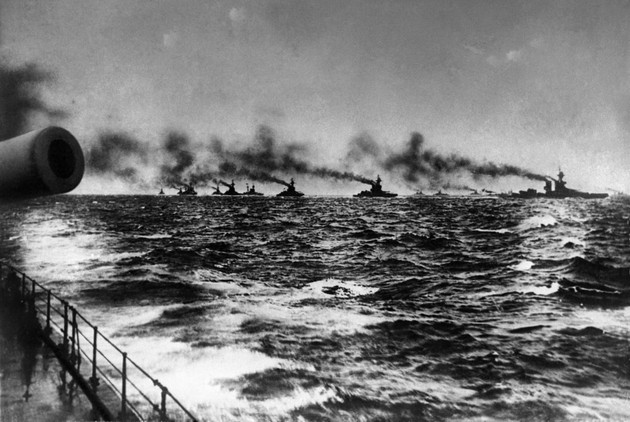
The British Grand Fleet on its way to meet the Imperial German Navy’s fleet for the Battle of Jutland in 1916 (AP)
Crowe’s answer was unambiguous: Capability was key. As Germany’s economy surpassed Britain’s, Germany would not only develop the strongest army on the continent. It would soon also “build as powerful a navy as she can afford.” In other words, Kissinger writes, “once Germany achieved naval supremacy … this in itself—regardless of German intentions—would be an objective threat to Britain, and incompatible with the existence of the British Empire.”
Three years after reading that memo, Edward VII died. Attendees at his funeral included two “chief mourners”—Edward’s successor, George V, and Germany’s Kaiser Wilhelm—along with Theodore Roosevelt representing the United States. At one point, Roosevelt (an avid student of naval power and leading champion of the buildup of the U.S. Navy) asked Wilhelm whether he would consider a moratorium in the German-British naval arms race. The kaiser replied that Germany was unalterably committed to having a powerful navy. But as he went on to explain, war between Germany and Britain was simply unthinkable, because “I was brought up in England, very largely; I feel myself partly an Englishman. Next to Germany I care more for England than for any other country.” And then with emphasis: “I ADORE ENGLAND!”
However unimaginable conflict seems, however catastrophic the potential consequences for all actors, however deep the cultural empathy among leaders, even blood relatives, and however economically interdependent states may be—none of these factors is sufficient to prevent war, in 1914 or today.
In fact, in 12 of 16 cases over the last 500 years in which there was a rapid shift in the relative power of a rising nation that threatened to displace a ruling state, the result was war. As the table below suggests, the struggle for mastery in Europe and Asia over the past half millennium offers a succession of variations on a common story line.
Thucydides Case Studies
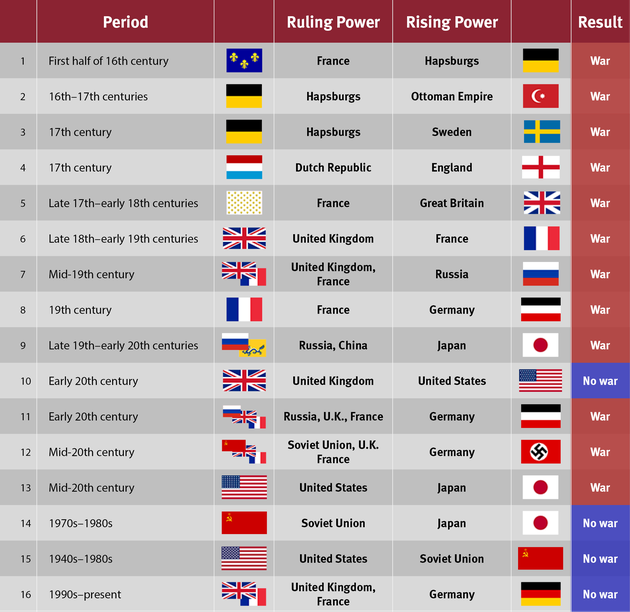 Harvard Belfer Center for Science and International Affairs
Harvard Belfer Center for Science and International Affairs
(For summaries of these 16 cases and the methodology for selecting them, and for a forum to register additions, subtractions, revisions, and disagreements with the cases, please visit the Harvard Belfer Center’s Thucydides Trap Case File. For this first phase of the project, we at the Belfer Center identified “ruling” and “rising” powers by following the judgments of leading historical accounts, resisting the temptation to offer original or idiosyncratic interpretations of events. These histories use “rise” and “rule” according to their conventional definitions, generally emphasizing rapid shifts in relative GDP and military strength. Most of the cases in this initial round of analysis come from post-Westphalian Europe.)
When a rising, revolutionary France challenged Britain’s dominance of the oceans and the balance of power on the European continent, Britain destroyed Napoleon Bonaparte’s fleet in 1805 and later sent troops to the continent to defeat his armies in Spain and at Waterloo. As Otto von Bismarck sought to unify a quarrelsome assortment of rising German states, war with their common adversary, France, proved an effective instrument to mobilize popular support for his mission. After the Meiji Restoration in 1868, a rapidly modernizing Japanese economy and military establishment challenged Chinese and Russian dominance of East Asia, resulting in wars with both from which Japan emerged as the leading power in the region.
Each case is, of course, unique. Ongoing debate about the causes of the First World War reminds us that each is subject to competing interpretations. A great international historian, Harvard’s Ernest May, taught that when attempting to reason from history, we should be as sensitive to the differences as to the similarities among cases we compare. (Indeed, in his Historical Reasoning 101 class, May would take a sheet of paper, draw a line down the middle of the page, label one column “Similar” and the other “Different,” and fill in the sheet with at least a half dozen of each.) Nonetheless, acknowledging many differences, Thucydides directs us to a powerful commonality.
* * *
The preeminent geostrategic challenge of this era is not violent Islamic extremists or a resurgent Russia. It is the impact that China’s ascendance will have on the U.S.-led international order, which has provided unprecedented great-power peace and prosperity for the past 70 years. As Singapore’s late leader, Lee Kuan Yew, observed, “the size of China’s displacement of the world balance is such that the world must find a new balance. It is not possible to pretend that this is just another big player. This is the biggest player in the history of the world.” Everyone knows about the rise of China. Few of us realize its magnitude. Never before in history has a nation risen so far, so fast, on so many dimensions of power. To paraphrase former Czech President Vaclav Havel, all this has happened so rapidly that we have not yet had time to be astonished.
My lecture on this topic at Harvard begins with a quiz that asks students to compare China and the United States in 1980 with their rankings today. The reader is invited to fill in the blanks.
Quiz: Fill in the Blanks
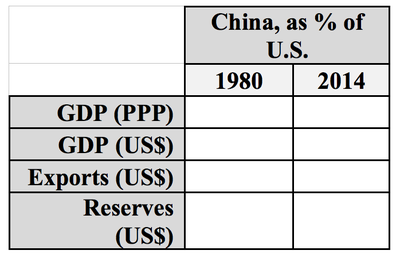
The answers for the first column: In 1980, China had 10 percent of America’s GDP as measured by purchasing power parity; 7 percent of its GDP at current U.S.-dollar exchange rates; and 6 percent of its exports. The foreign currency held by China, meanwhile, was just one-sixth the size of America’s reserves. The answers for the second column: By 2014, those figures were 101 percent of GDP; 60 percent at U.S.-dollar exchange rates; and 106 percent of exports. China’s reserves today are 28 times larger than America’s.
In a single generation, a nation that did not appear on any of the international league tables has vaulted into the top ranks. In 1980, China’s economy was smaller than that of the Netherlands. Last year, the increment of growth in China’s GDP was roughly equal to the entire Dutch economy.
The second question in my quiz asks students: Could China become No. 1? In what year could China overtake the United States to become, say, the largest economy in the world, or primary engine of global growth, or biggest market for luxury goods?
Could China Become #1?
Manufacturer:
Exporter:
Trading nation:
Saver:
Holder of U.S. debt:
Foreign-direct-investment destination:
Energy consumer:
Oil importer:
Carbon emitter:
Steel producer:
Auto market:
Smartphone market:
E-commerce market:
Luxury-goods market:
Internet user:
Fastest supercomputer:
Holder of foreign reserves:
Source of initial public offerings:
Primary engine of global growth:
Economy:
Most are stunned to learn that on each of these 20 indicators, China has already surpassed the U.S.
Will China be able to sustain economic-growth rates several times those of the United States for another decade and beyond? If and as it does, are its current leaders serious about displacing the U.S. as the predominant power in Asia? Will China follow the path of Japan and Germany, and take its place as a responsible stakeholder in the international order that America has built over the past seven decades? The answer to these questions is obviously that no one knows.
But if anyone’s forecasts are worth heeding, it’s those of Lee Kuan Yew, the world’s premier China watcher and a mentor to Chinese leaders since Deng Xiaoping. Before his death in March, the founder of Singapore put the odds of China continuing to grow at several times U.S. rates for the next decade and beyond as “four chances in five.” On whether China’s leaders are serious about displacing the United States as the top power in Asia in the foreseeable future, Lee answered directly: “Of course. Why not … how could they not aspire to be number one in Asia and in time the world?” And about accepting its place in an international order designed and led by America, he said absolutely not: “China wants to be China and accepted as such—not as an honorary member of the West.”
* * *
Americans have a tendency to lecture others about why they should be “more like us.” In urging China to follow the lead of the United States, should we Americans be careful what we wish for?
As the United States emerged as the dominant power in the Western hemisphere in the 1890s, how did it behave? Future President Theodore Roosevelt personified a nation supremely confident that the 100 years ahead would be an American century. Over a decade that began in 1895 with the U.S. secretary of state declaring the United States “sovereign on this continent,” America liberated Cuba; threatened Britain and Germany with war to force them to accept American positions on disputes in Venezuela and Canada; backed an insurrection that split Colombia to create a new state of Panama (which immediately gave the U.S. concessions to build the Panama Canal); and attempted to overthrow the government of Mexico, which was supported by the United Kingdom and financed by London bankers. In the half century that followed, U.S. military forces intervened in “our hemisphere” on more than 30 separate occasions to settle economic or territorial disputes in terms favorable to Americans, or oust leaders they judged unacceptable.
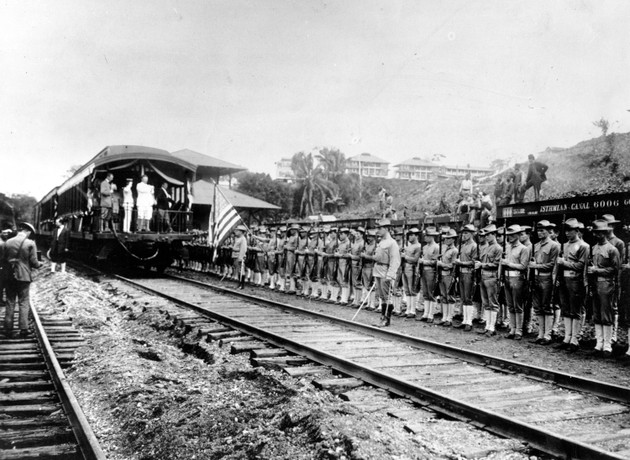 Theodore Roosevelt with U.S. troops at the Panama Canal Zone in 1906 (Wikimedia)
Theodore Roosevelt with U.S. troops at the Panama Canal Zone in 1906 (Wikimedia)
For example, in 1902, when British and German ships attempted to impose a naval blockade to force Venezuela to pay its debts to them, Roosevelt warned both countries that he would “be obliged to interfere by force if necessary” if they did not withdraw their ships. The British and Germans were persuaded to retreat and to resolve their dispute in terms satisfactory to the U.S. at The Hague. The following year, when Colombia refused to lease the Panama Canal Zone to the United States, America sponsored Panamanian secessionists, recognized the new Panamanian government within hours of its declaration of independence, and sent the Marines to defend the new country. Roosevelt defended the U.S. intervention on the grounds that it was “justified in morals and therefore justified in law.” Shortly thereafter, Panama granted the United States rights to the Canal Zone “in perpetuity.”
* * *
When Deng Xiaoping initiated China’s fast march to the market in 1978, he announced a policy known as “hide and bide.” What China needed most abroad was stability and access to markets. The Chinese would thus “bide our time and hide our capabilities,” which Chinese military officers sometimes paraphrased as getting strong before getting even.
With the arrival of China’s new paramount leader, Xi Jinping, the era of “hide and bide” is over. Nearly three years into his 10-year term, Xi has stunned colleagues at home and China watchers abroad with the speed at which he has moved and the audacity of his ambitions. Domestically, he has bypassed rule by a seven-man standing committee and instead consolidated power in his own hands; ended flirtations with democratization by reasserting the Communist Party’s monopoly on political power; and attempted to transform China’s engine of growth from an export-focused economy to one driven by domestic consumption. Overseas, he has pursued a more active Chinese foreign policy that is increasingly assertive in advancing the country’s interests.
While the Western press is seized by the story line of “China’s economic slowdown,” few pause to note that China’s lower growth rate remains more than three times that of the United States. Many observers outside China have missed the great divergence between China’s economic performance and that of its competitors over the seven years since the financial crisis of 2008 and Great Recession. That shock caused virtually all other major economies to falter and decline. China never missed a year of growth, sustaining an average growth rate exceeding 8 percent. Indeed, since the financial crisis, nearly 40 percent of all growth in the global economy has occurred in just one country: China. The chart below illustrates China’s growth compared to growth among its peers in the BRICS group of emerging economies, advanced economies, and the world. From a common index of 100 in 2007, the divergence is dramatic.
GDP, 2007 — 2015
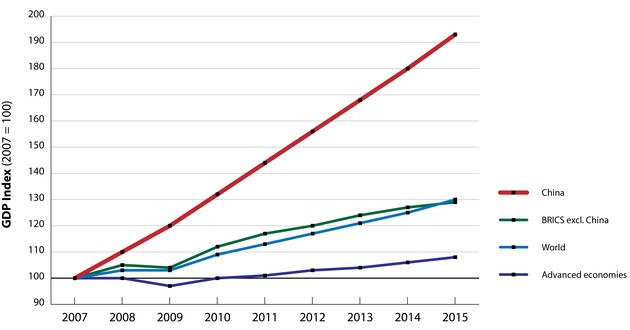
Harvard Belfer Center / IMF World Economic Outlook
Today, China has displaced the United States as the world’s largest economy measured in terms of the amount of goods and services a citizen can buy in his own country (purchasing power parity).
What Xi Jinping calls the “China Dream” expresses the deepest aspirations of hundreds of millions of Chinese, who wish to be not only rich but also powerful. At the core of China’s civilizational creed is the belief—or conceit—that China is the center of the universe. In the oft-repeated narrative, a century of Chinese weakness led to exploitation and national humiliation by Western colonialists and Japan. In Beijing’s view, China is now being restored to its rightful place, where its power commands recognition of and respect for China’s core interests.
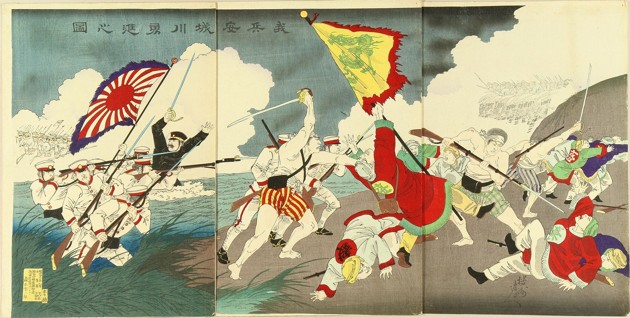
A woodblock painting depicts the First Sino-Japanese War. (Toyohara Chikanobu / Wikimedia)
Last November, in a seminal meeting of the entire Chinese political and foreign-policy establishment, including the leadership of the People’s Liberation Army, Xi provided a comprehensive overview of his vision of China’s role in the world. The display of self-confidence bordered on hubris. Xi began by offering an essentially Hegelian conception of the major historical trends toward multipolarity (i.e. not U.S. unipolarity) and the transformation of the international system (i.e. not the current U.S.-led system). In his words, a rejuvenated Chinese nation will build a “new type of international relations” through a “protracted” struggle over the nature of the international order. In the end, he assured his audience that “the growing trend toward a multipolar world will not change.”
Given objective trends, realists see an irresistible force approaching an immovable object. They ask which is less likely: China demanding a lesser role in the East and South China Seas than the United States did in the Caribbean or Atlantic in the early 20th century, or the U.S. sharing with China the predominance in the Western Pacific that America has enjoyed since World War II?
And yet in four of the 16 cases that the Belfer Center team analyzed, similar rivalries did not end in war. If leaders in the United States and China let structural factors drive these two great nations to war, they will not be able to hide behind a cloak of inevitability. Those who don’t learn from past successes and failures to find a better way forward will have no one to blame but themselves.
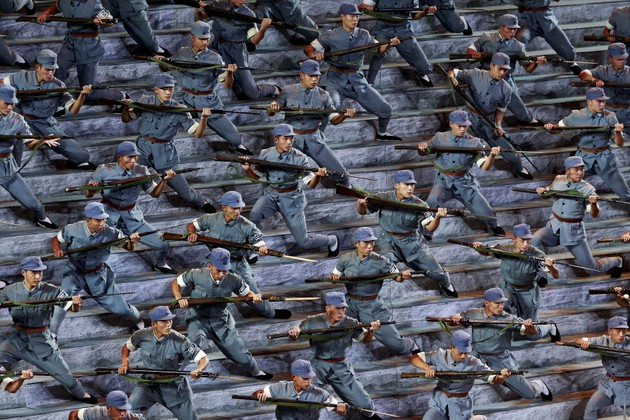
Actors dressed as Red Army soldiers mark the 70th anniversary of the end of World War II, in Beijing. (Kim Kyung-Hoon / Reuters)
At this point, the established script for discussion of policy challenges calls for a pivot to a new strategy (or at least slogan), with a short to-do list that promises peaceful and prosperous relations with China. Shoehorning this challenge into that template would demonstrate only one thing: a failure to understand the central point I’m trying to make. What strategists need most at the moment is not a new strategy, but a long pause for reflection. If the tectonic shift caused by China’s rise poses a challenge of genuinely Thucydidean proportions, declarations about “rebalancing,” or revitalizing “engage and hedge,” or presidential hopefuls’ calls for more “muscular” or “robust” variants of the same, amount to little more than aspirin treating cancer. Future historians will compare such assertions to the reveries of British, German, and Russian leaders as they sleepwalked into 1914.
The rise of a 5,000-year-old civilization with 1.3 billion people is not a problem to be fixed. It is a condition—a chronic condition that will have to be managed over a generation. Success will require not just a new slogan, more frequent summits of presidents, and additional meetings of departmental working groups. Managing this relationship without war will demand sustained attention, week by week, at the highest level in both countries. It will entail a depth of mutual understanding not seen since the Henry Kissinger–Zhou Enlai conversations in the 1970s. Most significantly, it will mean more radical changes in attitudes and actions, by leaders and publics alike, than anyone has yet imagined.




